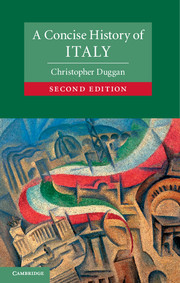Book contents
- Frontmatter
- Contents
- List of Illustrations
- List of Maps
- List of Tables
- Preface
- Chronology
- Introduction
- 1 The geographical determinants of disunity
- 2 Disunity and conflict: from the Romans to the Renaissance, 400–1494
- 3 Stagnation and reform, 1494–1789
- 4 The emergence of the national question, 1789–1849
- 5 Italy united
- 6 The liberal state and the social question, 1870–1900
- 7 Giolitti, the First World War, and the rise of Fascism
- 8 Fascism
- 9 The Republic
- Bibliographical essay
- Index
7 - Giolitti, the First World War, and the rise of Fascism
Published online by Cambridge University Press: 05 June 2014
- Frontmatter
- Contents
- List of Illustrations
- List of Maps
- List of Tables
- Preface
- Chronology
- Introduction
- 1 The geographical determinants of disunity
- 2 Disunity and conflict: from the Romans to the Renaissance, 400–1494
- 3 Stagnation and reform, 1494–1789
- 4 The emergence of the national question, 1789–1849
- 5 Italy united
- 6 The liberal state and the social question, 1870–1900
- 7 Giolitti, the First World War, and the rise of Fascism
- 8 Fascism
- 9 The Republic
- Bibliographical essay
- Index
Summary
Economic Growth and the Idealist Revolt
The crisis of the 1890s had brought Italy’s political system to the brink of collapse. Crispi contemplated a presidential alternative. An elected Chamber, he told the queen in 1895, was unworkable, and suggested that it should be replaced with a non-elected and purely consultative Senate. In 1897 he again voiced his profound disquiet, and urged the adoption of the German model: ‘Whenever parliament is involved in government, it leads to the abyss . . . The king does not rule, he is ruled . . . If we carry on with the present system, we will have a revolution.’ Many felt that a revolution, or at least some form of fundamental political or spiritual regeneration, was in fact the answer. Marxism swept the universities in the 1890s and became the dominant creed of intellectuals; and even Gabriele D’Annunzio, Italy’s leading exponent of decadentism, crossed the floor of the Chamber of Deputies in 1900 to join the Socialists: ‘As a man of intellect, I go towards life’, he declared.
The atmosphere of crisis brought to a head the uncertainties about Italy’s identity that had been in the air since the 1870s. Crispi’s heroic vision of national greatness was rooted largely in the past, in the Risorgimento; others preferred to look to an imagined future. The upturn in the economy from the end of the century opened up an alternative path, and for a while rekindled the dream of Cavour and the moderates that the country’s liberal institutions could be legitimated through a growth in material prosperity. ‘We are at the beginning of a new historical period’, proclaimed Giovanni Giolitti confidently in February 1901. Giolitti was to dominate Italian politics in the decade and a half leading up to the outbreak of the First World War. Like Cavour, he put his faith in economic modernisation; but unlike him, he looked to industry rather than agriculture to lead the way forward.
- Type
- Chapter
- Information
- A Concise History of Italy , pp. 173 - 206Publisher: Cambridge University PressPrint publication year: 2013



